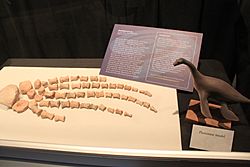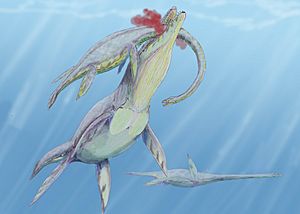Woolungasaurus facts for kids
Quick facts for kids Woolungasaurus |
|
|---|---|
 |
|
| Paddle | |
| Scientific classification | |
| Kingdom: | |
| Phylum: | |
| Class: | |
| Superorder: | |
| Order: | |
| Suborder: | |
| Family: |
†Elasmosauridae
|
| Genus: |
†Woolungasaurus
P.O. Persson 1960
|
| Species | |
|
|
Woolungasaurus (say "Woo-lun-ga-SAW-rus") was a type of ancient marine reptile called a plesiosaur. It lived in the oceans around Australia about 120 million years ago. This was during the Early Cretaceous period. Its name means 'Woolunga lizard'. It was named after a mythical reptile from Aboriginal stories.
Woolungasaurus belonged to a group of plesiosaurs called Elasmosauridae. These reptiles were known for their very long necks. They were skilled swimmers in the ancient seas.
Contents
Discovering Woolungasaurus
The main type of Woolungasaurus is called Woolungasaurus glendowerensis. It was named by a scientist named Per Ove Persson in 1960. He named it after Glendower Station, a place in Australia.
Scientists found a partial skeleton of this animal. This special skeleton is called a holotype. It is known as QM F6890. It included 46 bones from its spine, ribs, and parts of its front and back flippers. It also had parts of its shoulder bones.
This important fossil was dug up in the Richmond District of Queensland, Australia. It came from a rock layer called the Wallumbilla Formation. This rock layer formed during the Albian age of the Early Cretaceous period.
Another set of 12 spine bones was found near Lake Eyre in South Australia. These bones were from the Maree Formation. Their exact age is not certain, but they are from the Cretaceous period. In 1982, Persson also described a skull found in Queensland. He thought this skull might also belong to Woolungasaurus.
What Did Woolungasaurus Look Like?
Woolungasaurus was a typical elasmosaur. This means it had a long neck and a streamlined body. It had about 40 sharp teeth, which it likely used to catch fish and other sea creatures.
Scientists believe Woolungasaurus was about 9.5 meters (about 31 feet) long. That's longer than a school bus! Persson, the scientist who named it, thought it was closely related to another elasmosaur called Hydralmosaurus, which lived in North America.

Changing Ideas About Woolungasaurus
Sometimes, scientists learn new things about ancient animals. They might decide that an animal belongs to a different group or genus. In 2004, a scientist named Sven Sachs suggested that Woolungasaurus should be grouped with another plesiosaur called Styxosaurus. This means some scientists now think Woolungasaurus might be a type of Styxosaurus. This is a normal part of how science works as new discoveries are made.
See also
 In Spanish: Woolungasaurus para niños
In Spanish: Woolungasaurus para niños

